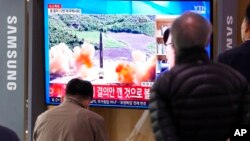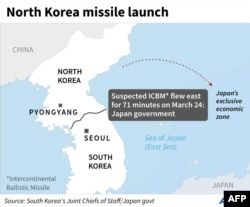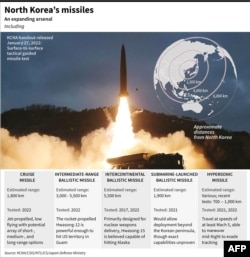North Korea launched an intercontinental ballistic missile Thursday, the United States and its allies in the region concluded, Pyongyang's first long-range launch since 2017.
The launch significantly raised tension on the Korean Peninsula. Just two hours later, South Korea fired five of its own missiles, in what it called a "demonstration of our ability and willingness to respond immediately and impose punishment."
The North Korean missile flew for over 70 minutes, at a lofted trajectory, before landing just 170 kilometers west of Japan's Aomori Prefecture, according to Japan's Ministry of Defense.
Japanese Prime Minister Fumio Kishida, speaking from Brussels, where he is attending a G-7 summit, called the move "an outrage that cannot be forgiven."
The missile appeared to be a new type of ICBM, Japanese officials added, saying it reached an altitude of 6,000 kilometers and had a range of 1,100 kilometers.
South Korea's military offered similar figures, saying the apparent ICBM was launched from the Sunan area near Pyongyang – the same area where a North Korean missile last week failed shortly after launch, exploding mid-air.
During an emergency meeting of South Korea's National Security Council, South Korean President Moon Jae-in "strongly condemned" the launch, saying it violated North Korea's self-imposed moratorium on long-range missile tests, according to a presidential statement.
In a statement, the White House called the launch a "brazen violation of multiple U.N. Security Council resolutions" that "needlessly raises tensions and risks destabilizing the security situation in the region."
"The door has not closed on diplomacy, but Pyongyang must immediately cease its destabilizing actions. The United States will take all necessary measures to ensure the security of the American homeland and Republic of Korea and Japanese allies," the White House statement added.
North Korea has repeatedly warned it is preparing to launch a military spy satellite. U.S. officials said such a launch would also essentially amount to a long-range missile test.
It is not yet clear whether North Korea's latest launch involved a satellite. North Korea has not commented on the test. It usually does not announce its missile activities until the following morning in state media.
North Korea has not launched a satellite since 2016. Its most recent ICBM test was in 2017, during the height of tensions between North Korean leader Kim Jong Un and former U.S. President Donald Trump.
Kim announced a self-imposed moratorium on ICBM and nuclear tests in 2018, amid talks with Trump and his South Korean counterpart, President Moon Jae-in.
North Korea resumed short-range launches in 2019. This year, it has conducted 12 rounds of missile launches, as it systematically works through a wish list of strategic weapons laid out last year by Kim.
The wish list included ICBMS large enough to carry multiple warheads and that can travel at least 15,000 kilometers. Analysts say the latest test appears to involve the Hwasong-17, which is an attempt to check those two boxes.
The Hwasong-17, which analysts say was likely the missile fired Thursday, was first unveiled during a parade in October 2020. Experts dubbed it the "monster missile." They noted it appeared large enough to carry multiple warheads, a capacity that would make it much harder for U.S. missile defenses to intercept.
Though the U.S. and its allies will likely respond firmly to the test, it is not clear North Korea will suffer major consequences. China and Russia, both veto-wielding members of the United Nations Security Council, not only oppose further sanctions, but say current sanctions on Pyongyang should be relaxed.
"And North Korea and Russia have become even closer in recent weeks with Pyongyang publicly supporting Moscow after the invasion of Ukraine. So there is no chance that we will see new U.N. sanctions on North Korea," said Ramon Pacheco Pardo, a Korea specialist at King's College London
"The U.S. can ramp up sanctions, and others will follow. But the North Korean economy is not going to become more isolated than it has been these past two years. And I would assume that China and Russia will provide the necessary economic and energy support," he added.
That contrasts the period of North Korea tensions in 2017, when the United States was able to work with China and Russia to impose tough new sanctions on North Korea.
Another difference from 2017 is that Trump, who threatened to "totally destroy North Korea" and who bragged about the size of his "nuclear button," is no longer U.S. president.
Mason Richey, a professor at South Korea's Hankuk University of Foreign Studies, said Biden will likely maintain a "more measured tone" toward North Korea.
On the other hand, Moon, whose diplomacy with Pyongyang eventually helped lead to the Trump-Kim negotiations, leaves office in May. He will be replaced by conservative former prosecutor Yoon Suk-yeol.
"And the conservatives have already telegraphed that they're going to take a really firm and even potentially escalatory stance, to try to impose costs on North Korea for this behavior. And so that's a wild card we didn't have before," Richey said.
Yoon's transition team released a statement Thursday calling the North Korean launch a "serious provocation."










